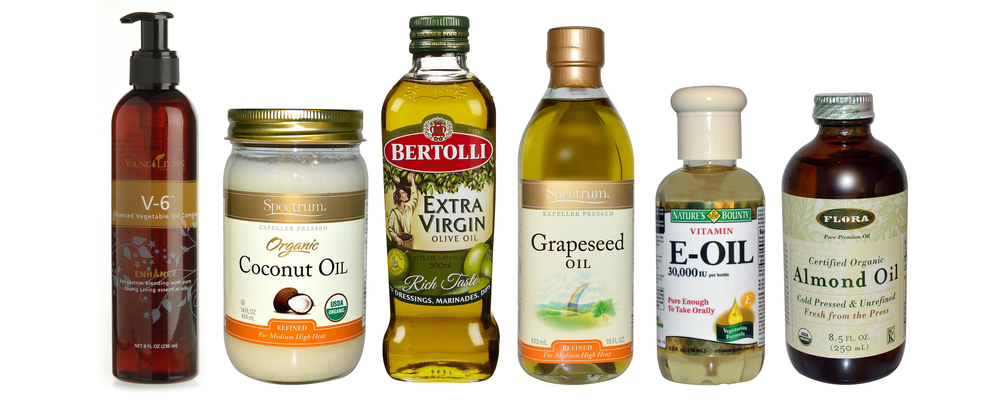What are Carrier Oils and Why is it Important to Use them in Tandem with Some Essential Oils?11/9/2015 By Lori Lines
Carrier oils are vegetable oils derived from fatty portions of plants, usually from nuts, kernels, or the seeds. The term carrier oil is derived from their purpose in carrying the essential oil onto the skin. They are used to dilute essential and other oils prior to topical application. This is because absolutes, CO2s, essential oils and other aromatics when applied to the skin undiluted can cause severe reactions or irritation in some individuals. Each carrier oil has different combination of therapeutic characters and properties. So the therapeutic benefit you seek is what determines the choice of particular carrier oil. Lip balms, body oils, natural lotions, bath oils, creams, and other moisturizing skin care products are also made using carrier (vegetable) oils. From a more complex natural lotion to a simple carrier oil/essential oil blend, the choice of carrier oil can make a difference in the overall aroma, therapeutic properties, shelf life, and color of the final product. Carrier Oils vs. Essential Oils Carrier oils are pressed from the fatty portions of plants (kernels, nuts, seeds) and do not impart their aroma as strongly as essential oils. They also do not evaporate. Essential oils, on the other hand, are distilled from the roots, bark, leaves and other aromatic portions of a botanical. Another notable difference is that essential oils don’t go rancid over time but carrier oils do. However, Essential oils "oxidize" and lose their therapeutic benefits over time. Base Oils /Fixed Oils/Vegetable Oils In normal skin care, carrier oils are usually referred to as base oils, fixed oils or vegetable oils. The term carrier oil is generally limited to use within the aromatherapy practice. Not all base oils or fixed oils are vegetable oils. Marine (fish) and Emu oils are also classified as base/fixed oils, but animal-based oils are typically not used in aromatherapy. The Aroma of Carrier Oils Generally speaking, most carrier oils have a nutty, faintly sweet aroma, but a few are odorless. If a carrier oils has a strong, bitter aroma it may have gone rancid. If possible, compare the aroma of the oil that you suspect has gone rancid with the same botanical oil that you know is fresh. Difference in smell will help you know whether your oil has gone rancid. Method of extraction, tocopherols, and the level of natural fatty acids plus other characteristics of oil all can affect how quickly it becomes rancid. Carrier oils that you purchase should be unadulterated and natural. If you can’t get the unadulterated and natural oil then you can buy carrier oils that have natural Vitamin E added. They are also good for the well-being of your skin because Vitamin E acts as a natural preservative and is therefore often listed as tocopherols. Shopping For Carrier Oils Most typical vegetable oils sold in grocery stores are not cold-pressed but are processed using heat. Strive to shop with suppliers and retailers that specialize in the sale of natural skin care or aromatherapy ingredients. To avoid rashes forming on your skin, ensure you buy fresh oils from a reputable company like Young Living Essential Oils. Any dust on the storage bottle may indicate the oil has been sitting around for awhile. Go for oils with no additives and those that are not blends of four or more oils. Also consider:
Which Carrier Oils to Use with Essential Oils Whenever you’re applying essential oils to your skin, you’ll need a base oil to serve as “carrier oil”. The best carrier oils to consider include: Organic and Unrefined Coconut Oil, Sweet Almond oil, Apricot Kernel oil, Sunflower oil, Arnica oil, Olive oil, Avocado oil, Calendula oil, Canola oil, Castor oil, Corn oil, Wheatgerm oil, St. John’s Wort oil, Safflower oil, Sweet Almond oil, Vitamin E oil, Walnut oil, and Soy oil, etc. Storage of Carrier Oils Carrier oils that are supposed to be kept for a long duration and those that are fragile should be stored in a cool, dark location in dark glass bottles with tight fitting tops. Cobalt Boston or Amber bottles are ideal. However, if you plan to use the oil before its lifespan, there’s no need to transfer them into dark bottles. Carrier oils can be stored in plastic but essential oils must always be stored in glass bottles because they can dissolve plastic.
0 Comments
Your comment will be posted after it is approved.
Leave a Reply. |
Author Lori LinesDisclaimer: Lori is a high-level channel. The information contained on this site is intended for educational purposes only and is not a substitute for advice, diagnosis or treatment by a licensed physician. You should seek prompt medical care for any health issues and consult your doctor before using alternative medicine or making a change to your regimen. Categories
All
|
Lori Lines, All Rights Reserved
DISCLAIMER
"The services I render are held out to the public as non-therapeutic hypnotism, defined as the use of hypnosis to inculcate positive thinking and the capacity for self-hypnosis. I do not represent my services as any form of health care or psychotherapy, and despite research to the contrary, by law I may make no health benefit claims for my services." - Lori Lines


 RSS Feed
RSS Feed
